- Home
- Q. Patrick
The Cases of Lieutenant Timothy Trant (Lost Classics) Page 3
The Cases of Lieutenant Timothy Trant (Lost Classics) Read online
Page 3
Vaguely the editor in Leslie thought: A policeman shouldn’t look like that at all. He’s too amiable, too unconcerned—too poised.
He asked quietly about her discovery of the body, a flicker of interest showing in his eyes when she mentioned Robert Boyer, which hinted that, he had read or at least heard of The Story of Mark.
“I’m afraid I’ll have to ask you and Mr. Boyer to come with me upstairs.”
Leslie shuddered away from the thought of having to revisit the studio, but there was something about Lieutenant Trant that commanded unquestioning obedience. With a little clutch at Robert’s arm, she moved toward the door. The lieutenant signalled one of his men to stay in the living room and ordered the others to follow.
“Isn’t that girl with the silver fox cape Faith Felton, the actress?” he asked as they went up the stairs.
Robert Boyer nodded.
“Quite a few celebrities present, aren’t there?” From the way he talked, he might almost have been just another guest arriving at the party.
His unruffled manner brought her a little composure. She, Leslie Cole, had known Minna Lucas, known her as an embittered, pathetic girl with a scarred face and a burning ambition to be a novelist in spite of her absence of talent. Minna had been her roommate. Minna had been alive and now was—dead. To her, this was something shocking that slashed straight across her own personal existence.
But to the police this was just another case of a neurotic girl who had shot herself in a morbid, neurotic manner. Just part of the regular police routine...
At the studio door she felt an overwhelming desire to turn and run back down the narrow stairs. But the policemen behind her seemed to hem her in. Robert was handing the key of the studio to Lieutenant Trant. The detective had opened the door.
The macabre tableau looked exactly the same as her memory of it. Minna lay stretched there close to the wood box, the pages of manuscript by her head gleaming red in the light from the fire.
In the brief moment while she looked at the body, Leslie felt a queer stab of guilt. It was partly her fault this terrible thing had happened. She had refused Weeds in a report that was brutally frank. If only she had let Minna down a little more gently!
Poor Minna!
Robert’s arm was still steadying her.
“You haven’t touched anything, Miss Cole?” Lieutenant Trant’s quiet, voice seemed to come from miles away.
“N-no. Nothing.”
The detective’s gaze moved to Robert. “And you?”
“I went over to her. Had to find out if there was anything we could do.”
“Of course.”
“And I took this out of her hand.” Robert passed the detective the crumpled sheet of manuscript with its red “Finis.”
“It’s the last page of a novel she’d been writing.”
The young detective’s grey eyes glanced over the sheet. “And all the paper on the floor, that’s her novel too? You’re both literary people, aren’t you? Had someone rejected the manuscript?”
Leslie said, “Yes, I—that is, Morton and Bidlake refused it. I’m one of the editors. I’m afraid she just couldn’t write and...”
“And you think that she took her life in a fit of depression consequent upon her disappointment?”
“I—I suppose so.”
The lieutenant had moved toward the fireplace. He was not looking at the body. Suddenly he stooped to examine a splintered abrasion on one of the oak supports of the mantel about two feet from the ground.
“That’s where the bullet struck,” he murmured. “Must have passed right through her head.”
“Doc’s arrived,” announced one of the policemen by the
door.
Almost immediately a short, grey-haired man carrying a black bag hurried into the room. He nodded to Trant and went straight to the body, bending over it with impersonal interest.
“Hm, gave herself quite a bang on the head when she fell, Trant. Guess she must have hit this sharp corner of the wood box.”
Somehow that flat, disinterested comment from the medical examiner seemed more shocking to Leslie than any of the ghastly things that had come before. The floor seemed to shift under her feet; her hand found Robert’s arm again. As if he sensed how she was feeling, Lieutenant Trant said, “Would you and Mr. Boyer mind joining the others now, Miss Cole? I’ll want to talk to you again when the medical examiner is through.”
* * *
When they returned to the living room, the other guests had split up into tense little groups. Faith Felton and Jimmy Harding, conscious of their position as important, busy people in the theatre, stood by the door, impatient to be gone. Yvonne Prevost and Dave Walker sat together on the couch. All vestiges of the girl’s hysterical outburst had been obliterated. Her dark eyes stared flat and enigmatic from a white, scarlet-lipped face.
Robert and Leslie joined Gordy Keath, who sat perched on the radiator. With an attempt at frivolity, he said, “This has turned out to be a nice little item for your mystery list, Leslie.”
Someone had cut the radio off, but the windows were still wide open, bringing a bluster of night air and street noises into the room. The policeman who had been left on guard stood large and impersonal by the front door, a constant reminder that this was a party no longer.
To Leslie, sitting there in the unbroken silence, it seemed hours before anything happened. At some stage she glanced at her watch. It was past seven. And for the first time she remembered that Gordy Keath had invited her to a première that evening.
By all that was reasonable, she and Gordy should be snatching dinner somewhere now, manoeuvring like affectionate fencers around the subject of some manuscript he had to sell. Dinner and a show with Gordy! The fascinating game of getting the really good manuscript you wanted, like The Story of Mark, and not being talked into buying the unsaleable Weeds of contemporary fiction... all that was the very fibre of life as Leslie loved it. And yet now it seemed utterly remote. Something that couldn’t possibly happen. All because Minna had done this ghastly thing.
At last one of Trant’s officers appeared and beckoned to Robert and Leslie. They were conducted to Minna’s bedroom where Lieutenant Trant, tall and masculine and distinctly out of place in that frilly feminine room, was sitting on the edge of the bed beside the coats of the female members of the party. As they entered, he nodded the officer away and indicated two chairs.
The detective’s manner was as sympathetic and casual as before. And yet it seemed to Leslie that some obscure change had come over him. It was as if the casualness were deceptively on the surface now. And the grey eyes which had been reassuring, almost respectful when he first arrived, were scrutinizing them a little too intently.
He listened in unrevealing silence while Robert described their arrival at the house, the suggestion that the party should be moved upstairs and their subsequent discovery in the studio.
“Thank you, Mr. Boyer.” His voice was very polite. “You don’t happen to know if the deceased has any near relatives?”
Leslie broke in: “Not in New York. I roomed with her for a while. She came from some small town in the West. Miss Felton would know about her people. She’s from the same place and they were brought up together.”
“I see.” Lieutenant Trant’s interest seemed abruptly to have waned. He was lost in a minute examination of his own left thumbnail. “Mr. Boyer, I’ve been glancing through Miss Lucas’ papers, and I gather she worked for you as secretary.”
“Yes. But she left me about ten months ago to get married.”
Robert told him the pathetic story of the automobile accident which had scarred Minna’s face and led to her broken engagement. He explained how her stubborn determination to write a novel had made her refuse his subsequent offer to return to him as secretary.
“It was a pretty tough time for her, but the girl had plenty of courage. She must have been living on a shoestring when she wrote that book. I’d helped a bit with the hospital bills,
but I know she had practically no money of her own.”
“For someone living on a shoestring, this is quite a nice house.” Lieutenant Trant still seemed more interested by his thumbnail than the conversation. “How about the man she was engaged to?”
“He’s a young lawyer—David Walker.” Robert looked rather embarrassed. “He’s here at the party.”
Lieutenant Trant did glance up then. “You mean there’s been a reconciliation?”
“No, no. He’s engaged to another girl now, Yvonne Prevost who designed the jacket for my book. She’s downstairs, too.”
If this information had importance for Lieutenant Trant he gave no outward sign of it.
“Tell me about Miss Lucas’ novel.”
Robert explained how Minna had brought him the finished manuscript and begged him to try to help her place it. He had read it without enthusiasm, but had handed it over to his own literary agent, Gordon Keath, with a request to do his best for it.
“I didn’t hear any more about it until Minna called me yesterday to invite me to this party.”
“Did she hint in any way that the party was going to be—well, unusual?”
“No. She just said she was celebrating some news on the book. I imagined she’d found a publisher. She especially asked me to bring Miss Cole as a representative of Morton and Bidlake.”
“One of the publishers who had turned the book down.” Trant’s grey eyes suddenly dropped their pose of indifference. “You’re assuming that, in fact, she had given up all hope of finding a publisher and had decided to shoot herself. And you think she deliberately invited to her house the people she felt had not appreciated her—simply to embarrass them by involving them in her suicide?”
Robert’s gaze fell to his strong, unauthorlike hands. “Something of that sort, I suppose.”
“I see.” Once again that flat, uncommunicative I see. “I know, of course, that women kill themselves for queer reasons. But lots of young authors must have first novels turned down without putting bullets through their heads. It doesn’t seem...”
He stopped the sentence as if the difficulty of completing it had been too much for him.
Impulsively Leslie said, “Of course thousands of young writers get disappointments and can still take it on the chin. But Minna was different. You must remember she’d been in on the biggest literary success of a decade, Mr. Boyer’s Story of Mark. And she became obsessed with the idea that she could hit the bull’s-eye with a novel too. Lots of secretaries to famous people go that way. She banked everything on the acceptance of Weeds. And we all turned her down flat. That was the last straw. She’d been pretty once, and that car accident had put her out of the running so far as men were concerned. She’d lost her looks and her man and now she was a failure as a writer too.”
Leslie’s small face had taken on a rapt, owl-like intensity. “Minna was beaten on all counts. She was through. She had every reason to say the devil with it all and—finis.”
Trant had been watching her soberly. Suddenly he smiled a vivid smile which was more frightening even than his former composure.
“As a matter of fact, Miss Cole, I agree with you. Miss Lucas had very good reason to commit suicide. That’s why I’m so interested in this case.” He paused. “Simply because she didn’t commit suicide.”
Leslie stared. “You—you can’t mean...”
“Yes, Miss Cole, I mean that Miss Lucas was deliberately and very cleverly—murdered.”
* * *
So that was Lieutenant Trant’s trump card. An icy sensation invaded Leslie as she gazed at the detective’s impassive face. It melted, giving way to a stubborn incredulity. Minna murdered! It was impossible, just some wild stratagem of Lieutenant Trant’s, intended in some way to jolt them. It couldn’t be true. It was mad—absurd.
And yet, very dim and remote, but terrifying now for its unconscious prescience, came the memory of her own voice speaking to Robert less than an hour ago: She’d murder any of us cheerfully... unless, of course, someone murders her first...
She had said that... she, Leslie Cole...
Robert, too, was staring at the lieutenant with the stupefied look of a man who had been struck unexpectedly.
"Minna—murdered! You can’t mean that seriously, lieutenant.”
“Very seriously. I’m surprised you two hadn’t guessed it for yourselves. You have most of the facts in your possession.” Trant shifted long legs, showing neat, unpolicemanlike brogues. “When I first saw the body I thought it unusual that she was lying on her back. In most cases when a suicide shoots himself in the head, the knees buckle under him and he falls either forward or sideways. There are no definite rules about that, though. Almost anything can happen after a bullet’s been fired into the brain.”
He looked at Leslie. “But there’s plenty of evidence without that. You saw the chipped hole where the bullet entered the wooden support of the mantel. It was less than two feet from the floor. An examination of the head shows that the bullet went right through the skull, travelling in a slightly upward direction. Obviously, if Miss Lucas had been standing, pressing the revolver to her temple, the bullet couldn’t conceivably have struck the mantel at a point only two feet above the floor.”
“But why should she have been standing up?” cut in Leslie. “She might easily have been sitting on the floor or lying down when she—pulled the trigger.”
Once again there was a faint smile in the detective’s grey eyes.
“It’s not customary to lie on the floor when you shoot yourself. Miss Cole. Besides, I believe you heard the medical examiner remark on the fact that there was a considerable swelling on the back of Miss Lucas’ head. She would have had to have fallen from a standing position to have caused a nasty lump like that. Since the bullet hole in the mantel proves she couldn’t have shot herself in a standing position, obviously she couldn’t have committed suicide.” His grey eyes, behind the slightly closed lids, were smooth and expressionless as suede. “Besides, there’s another point. The medical examiner is almost certain that the blow on the head was delivered before death. The weapon used was probably some sort of homemade blackjack or sandbag. It didn’t draw blood or fracture the skull, but the blow was sufficiently strong to render Miss Lucas unconscious. How could she have shot herself when she was lying on the floor—unconscious?”
There was something inescapable about those few, casually indicated facts.
Robert started to say something, but Trant went on imperturbably: “In my examination of the room I happened to notice a slight stain on one of the couch cushions. I picked it up. It smelt distinctly of—gunpowder.”
He added: “I’m afraid there’s only one satisfactory explanation to cover all the facts. Someone must have gone into that room, possibly engaged Miss Lucas in conversation and when her back was turned, struck her over the head with sufficient force to render her unconscious. After that he shot her as she lay on the floor, with a revolver which we are tracing, but which probably he found on the premises— since one of the drawers in the desk has been broken open. In an attempt to deaden the sound of the shot, he must have used the cushion from the couch as a muffler.”
He paused. “Having done that, he proceeded very skillfully to stage a suicide. He arranged the body conveniently near the corner of the wood box to account for the bump on the head; he put the gun in Miss Lucas’ right hand; he spread the manuscript of her novel around the floor for local color; he took the last page with its appropriately suicidal Finis in red ink—and crumpled it into her left hand.” He made an expressive gesture. “Apparently he fooled you two. He might have fooled everyone else if he hadn’t made those few elementary mistakes—if he hadn’t hit her just a little too hard on the head, if he had taken more care about the path of the bullet and the smell of gunpowder on the cushion.” His face was suddenly solemn. “Otherwise, he pulled off a very brilliant job indeed.”
Leslie struggled to cope with the implications of this fantastic thing he wa
s saying.
The lieutenant’s voice sounded again. “Do either of you know what time this party was scheduled to begin?”
“Minna asked us for half-past five,” said Robert bleakly.
“And you reported the discovery at six twelve. When did you arrive at the house?” Robert glanced uncertainly at Leslie who said, “It must have been just after six, because Mr. Boyer picked me up at my office at quarter of six. I looked at my watch. And it takes about fifteen minutes to get here. We were the last to arrive. We stayed downstairs a couple of minutes. Then we went up to the studio and—and found her.”
Trant nodded gravely. “Then at least neither of you two had an opportunity to commit the crime.”
Leslie said stupidly, “But how do you know?”
“That’s simple. You told me Mr. Boyer picked you up at your office at quarter of six and you found the body almost as soon as you arrived here.” Trant smiled deprecatingly. “It’s very rare that the time of a murder can be established definitely. But in this case the medical examiner tells me that, even taking into consideration the fact that she was lying near the fire, the temperature of the body shows that Miss Lucas had been dead less than an hour, probably less than forty minutes when he saw her at six-thirty.”
Robert was staring. “You’re trying to say Minna died at some time after half-past five, after the party was supposed to begin?”
“Certainly.” The detective looked down again at his left thumbnail. Leslie was beginning to realize that as the most ominous of his mannerisms.
Stifling back her incredulity, she breathed, “Then you mean that one of the people...”
“Exactly,” cut in Trant, and his voice was almost sad. “It’s virtually certain Miss Lucas was murdered after the party began. The back door is bolted on the inside; no one could very well have got in and out through the front door without being seen by some of the guests. Since she was probably killed much nearer to six than to five-thirty, there’s only one reasonable hypothesis to draw.”
He glanced up, his grey eyes very steady. “It seems almost beyond question that Miss Lucas must have been shot by one of her—er—friends, one of her guests who are waiting for us at the moment—downstairs.”

 Death Goes to School
Death Goes to School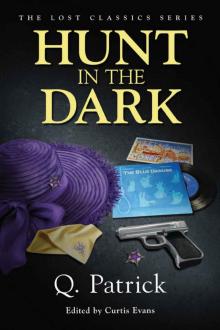 Hunt in the Dark
Hunt in the Dark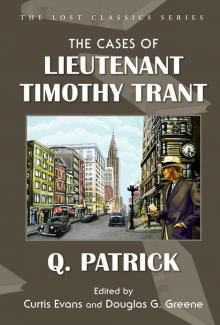 The Cases of Lieutenant Timothy Trant (Lost Classics)
The Cases of Lieutenant Timothy Trant (Lost Classics)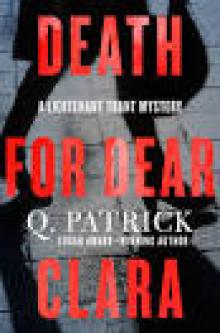 Death for Dear Clara
Death for Dear Clara S.S. Murder
S.S. Murder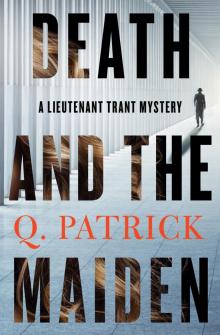 Death and the Maiden
Death and the Maiden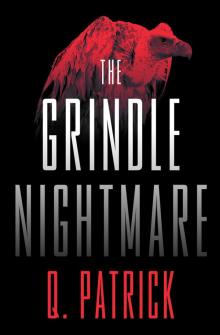 The Grindle Nightmare
The Grindle Nightmare Cottage Sinister
Cottage Sinister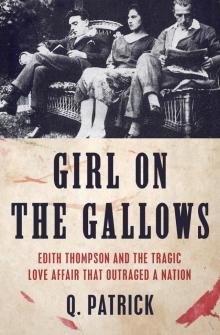 The Girl on the Gallows
The Girl on the Gallows